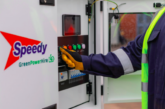Dry mortar specialist CPI EuroMix has taken further steps to reduce its carbon footprint by enabling its vehicle fleet to run on ‘cleaner’ Hydrotreated Vegetable Oil (HVO).
The switch from diesel to HVO, a paraffinic fuel produced from 100% renewable and sustainable waste, involves six trucks at CPI’s plant in Northfleet, Kent. Initially introduced for a trial period in November 2022, it’s anticipated the fossil-free fuel initiative will be subject to a wider roll-out at a number of the company’s factories.
Stuart Russell, Commercial Manager at CPI said: “The switch to HVO as an alternative to diesel for vehicles at our Northfleet plant is further evidence of our commitment to sustainable initiatives across all areas of the business. Our vehicle drivers are delighted to be trialling this excellent scheme. Employee buy-in is essential to us embellishing our reputation as an environmentally responsible manufacturer. So, we are extremely grateful for their continued cooperation.”
HVO is proven as a cleaner fuel option for on and off-road commercial fleets. Compliant with EN15940, which governs cleaner transport fuel for use in road vehicles standards, HVO offers an immediate reduction in CO2 emissions. This outcome is achieved without the need for changes to engine infrastructure or machinery. Unlike conventional biodiesel, hydrogen (rather than methanol) is used as a catalyst, which makes HVO cleaner burning and ensures a long shelf life.
CPI has implemented a number of effective measures as part of its sustainability strategy, which is underpinned by a commitment to four key areas: planet, customer and products, people and communities. Its environmental impact has been reduced through energy and waste management programmes and a proficient recycling scheme. Each initiative is guided by principles aligned to CPI’s ISO 14001 Environmental Management accreditation.
Last year, the company introduced an electric-powered forklift to its Rotherham bagging plant. Coupled with CPI’s zero-carbon electricity source, the shift to a battery-powered vehicle resulted in a healthy reduction in CO2 and diesel particulate emissions. CPI has also invested in a solar arrays’ initiative that presents an opportunity for partial power self-sufficiency in the months and years to come. Currently being implemented at various locations across CPI’s production sites, the solar arrays plan has already been actioned at the CPI’s Harlow, Manchester, Bilston and Bristol factories. It’s anticipated that each installation will produce up to 80 megawatts of energy each year, equating to a saving of more than 6% on the company’s annual power consumption.
CPI’s sustainable ambitions have also been enhanced by its initiation of a carbon capture forestry scheme containing nearly 100,000 trees. The programme, in conjunction with Potanow Forestry, will ensure deliveries by CPI vehicles, and those used by its contractors, are carbon neutral.
Stuart continued: “Our sustainability strategy has seen us achieve many challenging goals. We will never stop looking to reduce our carbon impacts, as the health and wellbeing of our environment is important to us as the wealth we create as a business.”









